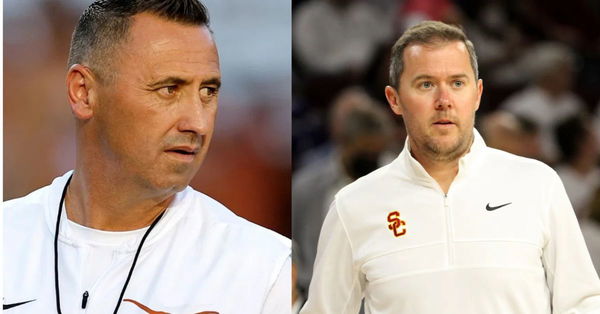

“Adapt or die,” they say, but who knew college football traditions would be the first casualties? The NIL era and the transfer portal have turned spring games, once sacred rituals, into collateral damage. Nebraska, Texas, and USC—they’ve all pulled the plug, leaving fans staring at empty stadiums and dashed hopes. Decades of tradition, gone in a puff of smoke. These weren’t just scrimmages; they were sneak peeks into the fall, a chance to see tomorrow’s stars today. Now? Just another blank space on the calendar. And it’s not just fans crying foul; analysts are calling out coaches like Sarkisian and Riley for playing it safe and sidelining the faithful.
Matt Rhule kicked things off with a shocker, canceling Nebraska’s spring game, citing “tampering” concerns aka players being poached. “The word ‘tampering’ doesn’t exist anymore,” Rhule bluntly stated. “It’s just absolute free, open, common market.” For the Huskers, that’s a blow—over 60,000 tickets sold, millions in revenue down the drain. Texas followed suit, with Sarkisian blaming “wear and tear.” And USC? Well, their spring game attendance was already thin, but now it’s a long wait for Coliseum action.
Enter CFB analyst Jake Crain, raising a crucial point. Spring games, he argues, are more than just football; they’re a vital part of the offseason experience. And Crain proposes a win-win solution: “You don’t have to abolish it. See, spring games should be played against smaller in-state opponents, like, for example, Alabama should play UAB, and Auburn should play Troy. It’s the best of both worlds because, like the Senior Bowl, the most useful part of the practices of spring practice isn’t the games; it’s the actual practices, and most coaches understand that the spring game is really for the fans.” Now spring games aren’t for coaches; they’re for the fans and the players, a chance to shine and build momentum. It’s about keeping the flame alive, giving fans content, and preparing athletes for the future.
ADVERTISEMENT
Article continues below this ad
Moreover, Crain proposes a sensible approach—compensate smaller schools, retain funds within the state, and provide valuable practice against unfamiliar strategies. This plan will keep fans happy with packed stadiums in April. Even if the backups mess up and lose, no big deal; it’s just a spring game. Everyone wins, so why ditch spring games when they can be useful?

So, Sark and Riley are big names, right? They drop this spring game cancellation bomb, and Crain’s co-host just goes off. “The coaches are already on the field, you’re running through game day schematics and logistics, it’s already kind of like a practice. You’re not putting your starters in jeopardy more than you would on any other practice. Here’s my thing, so if all I want, all I want is spring football practice to culminate with a public event in the stadium of some sort where four months after football season and four months before the next football season starts.” Basically, give the fans something. But, let’s be real, it’s not just about the fans. The fear of losing players? That’s a real thing.
Texas, USC, and Nebraska all saw players hit the transfer portal right after their spring games. It shows roster stability is tough in the NIL era. Texas lost former five-star WR Johntay Cook II to Washington, plus key defenders like Austin Jordan. USC saw defensive linemen Stanley Ta’ufo’ou and Deijon Laffitte leave, and Nebraska lost Ru’Quan Buckley to Michigan State. This highlights the real concern these teams have, especially with NIL changing everything.
Amidst this uncertainty, Lincoln Riley is making strategic moves to navigate the situation.
ADVERTISEMENT
Article continues below this ad
Lincoln Riley’s new approach to compensate for ditching Spring Game
Well, Lincoln Riley and the USC Trojans have also joined the trend of canceling spring games. The renowned Los Angeles team has officially called off its 2025 spring game, as initially reported by The Los Angeles Times and later confirmed by USC beat writer Ryan Kartje. Spring games have been a long-standing tradition at the Coliseum since the Pete Carroll era, offering fans an early peek at the Trojans in action. While the decision may disappoint those who anticipated this yearly event, USC is not completely stepping back; they are simply taking a different approach compared to Nebraska.

via Getty
photo by Aaron J. Thornton/Getty Images)
Instead of leaving a void in the offseason schedule, Riley and his team have organized two alternative events to maintain the program’s connection to its history and present. USC will hold an exclusive gathering for former players, emphasizing the strong bond between past Trojan stars and the current squad. Additionally, they plan a separate fan appreciation event for later in the summer, adding a unique element to their traditional “Salute to Troy” festivities. This adjustment signifies a change in plans rather than a complete shutdown.
ADVERTISEMENT
Article continues below this ad
However, missing the spring game has its drawbacks. Despite not reaching the attendance of Ohio State or Nebraska in the spring, USC still showcased its team’s talent effectively. Now fans will have to wait for the season opener to see how the Trojans are doing, as there is no public exhibition game. Since Riley’s arrival, USC’s tightly controlled spring practices have made their roster development a major enigma in college football, a level of secrecy few programs emulate.
ADVERTISEMENT
ADVERTISEMENT
ADVERTISEMENT
ADVERTISEMENT

